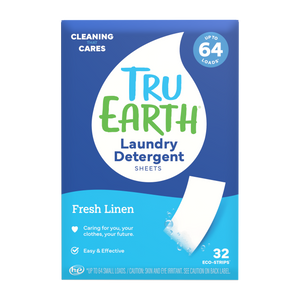Laundry is an essential part of our daily routine, and along with it comes the question of how to responsibly dispose of those empty detergent bottles. While many of us are committed to recycling, things can sometimes get a bit perplexing when it comes to laundry detergent bottles. Are they recyclable, or should they be tossed into the trash?
In this comprehensive guide, we will explore the intricate process of recycling laundry detergent bottles, ensuring that you recycle them and do it correctly. Additionally, we'll shed light on how Tru Earth, a pioneer in sustainable laundry products, is making strides in reducing plastic waste.

Understanding Laundry Detergent Bottles
Before we dive headfirst into the world of recycling, it's essential to understand the composition of laundry detergent bottles. Most of these bottles are crafted from high-density polyethylene (HDPE) or polyethylene terephthalate (PET) plastics.
These plastics are chosen for their durability and resistance to the harsh chemicals found in laundry detergents, ensuring the bottles can withstand the demands of the product inside.
Can You Recycle Laundry Detergent Bottles?
The good news is that, in most cases, laundry detergent bottles are recyclable. However, this recycling endeavor involves specific steps to ensure they are processed correctly.
Step 1: Empty and Rinse
Before you consider tossing your detergent bottle into the recycling bin, it's essential to ensure it's entirely empty. Furthermore, give it a thorough rinse to remove any lingering detergent residue. This initial step is vital as it helps prevent contamination during recycling, ensuring that the bottle can be efficiently repurposed.
Step 2: Check the Label
Not all detergent bottles are created equal, and some may feature labels that provide key information about their recyclability. Watch for recycling symbols, such as the familiar recycling arrows with a number inside. Most detergent bottles fall under recycling code 1 (PET) or 2 (HDPE), which is widely accepted for recycling across recycling facilities.
Step 3: Remove the Cap
In many recycling programs, removing the cap or pump dispenser from the bottle is best practice before recycling. These caps are often made of different types of plastic and may carry a separate recycling code. Separating the cap from the bottle ensures that each component is processed correctly according to its recycling code.
Commitment to Sustainable Packaging
Amid the growing concern over plastic waste, Tru Earth has pioneered the laundry detergent industry by championing sustainable packaging solutions. For instance, Tru Earth laundry detergent strips come in compostable cardboard packaging.
This innovative approach not only reduces plastic waste but also conserves valuable resources. Additionally, Tru Earth's laundry detergent strips are highly concentrated, which means less packaging overall, further reducing their environmental footprint.
Local Recycling Guidelines
While the fundamental rules for recycling laundry detergent bottles apply, you must familiarize yourself with local recycling guidelines. Recycling programs can vary significantly from one area to another, so adhering to the specific rules and regulations governing recycling practices in your community is essential.
Alternative Options
If, for some reason, your local recycling program does not accept detergent bottles or you're uncertain about the recycling rules, there are alternative methods to ensure these bottles are responsibly disposed of.
Plastic Film Drop-Off
Several grocery stores and retailers offer plastic film recycling drop-off locations. While detergent bottles aren't precisely "film," they are constructed from a similar plastic type. It's worth checking whether these drop-off points in your area accept detergent bottles for recycling.
Upcycling Projects
Get creative and explore ways to upcycle your empty detergent bottles. These versatile containers can be repurposed into various items, such as watering cans, storage containers, or even fun do-it-yourself (DIY) projects, especially if you involve your kids. Upcycling not only keeps these bottles out of landfills but also provides them with a new lease of life.
Environmental Impact
Recycling laundry detergent bottles transcends merely following the rules; it's about substantially impacting the environment. When you actively recycle these bottles, you reduce the demand for new plastic production. Consequently, this conserves precious natural resources, curtails energy consumption, and mitigates greenhouse gas emissions—contributing to a cleaner and more sustainable future.

Wrapping It Up
So, can you recycle laundry detergent bottles? The answer is an unequivocal yes! And more importantly, you absolutely should. By meticulously following the straightforward steps outlined here and ensuring compliance with your local recycling guidelines, you can guarantee that your empty detergent bottles are given a second life through recycling.
Recycling is a seemingly small but vital step towards a more sustainable future; remember, every bottle counts. So, empty, rinse, and recycle those bottles, and together, we can make a substantial difference for our beloved planet.

